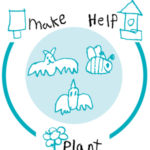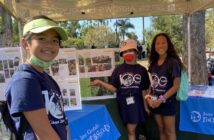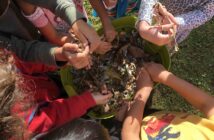In 2014, the Obama administration implemented a strategy to promote the health of honeybees and other pollinators with the help of The Department of Agriculture and the Environmental Protection Agency. However, with the changing administration, the situation for pollinators has changed as well. Trump has proposed to cut the budgets for both the USDA and the EPA, leaving wildlife and their habitats unprotected.
 But here’s the good news…the government isn’t necessary to turn things around for these winged animals. Each and every one of us can make a difference. Amelia Welborn and her Roots & Shoots group know that.
But here’s the good news…the government isn’t necessary to turn things around for these winged animals. Each and every one of us can make a difference. Amelia Welborn and her Roots & Shoots group know that.
In Maine, the Triple Wing Club (TWC), founded by Amelia and her fellow fourth-grade environmentalist, Dora, is working to save the pollinators one home and one flower at a time. TWC members build bat and bird houses that they deliver upon request to homeowners for no charge. Club members also grow flowering, non-invasive plants to attract butterfly, bee and hummingbird pollinators.
Why is the work of the TWC so important for pollinators? The population of these species is in decline due to habitat loss from deforestation, exposure to parasites and pesticides, and climate change. Without proper habitats, they have nowhere to live, eat and reproduce. The TWC creates safe spaces for various pollinators, so they can do their necessary part for the world.
Here’s how these special creatures perform their magic. Pollinators visit flowers in their search for food (nectar and pollen). During a flower visit, a pollinator may accidentally brush against the flower’s reproductive parts, unknowingly depositing pollen from a different flower. The plant then uses the pollen to produce a fruit or seed. Many plants cannot reproduce without pollen carried to them by foraging pollinators (USDA). The loss of pollinators would throw the ecosystem that we depend on out of whack.
According to USDA, three-fourths of the world’s flowering plants and about 35 percent of the world’s food crops depend on animal pollinators to reproduce. More than 3,500 species of native bees help increase crop yields. Some scientists estimate that one out of every three bites of food we eat exists because of animal pollinators like bees, butterflies, moths, birds, bats, and beetles. These statistics are striking and are the reason that the TWC’s small efforts are making a world of difference.
Here’s how you can help pollinators:
- Check out the Triple Wing Club’s Bluebird House Info sheet.
- Join the Pollinators + Migratory Species Roots & Shoots Community on Facebook to get project ideas, read important news, and more.
- Complete a 1-click campaign to help migratory species.
- Join Roots & Shoots and design your own campaign like Amelia and Dora did!

The Jane Goodall Institute is a global community conservation organization that advances the vision and work of Dr. Jane Goodall. By protecting chimpanzees and inspiring people to conserve the natural world we all share, we improve the lives of people, animals and the environment. Everything is connected—everyone can make a difference.









